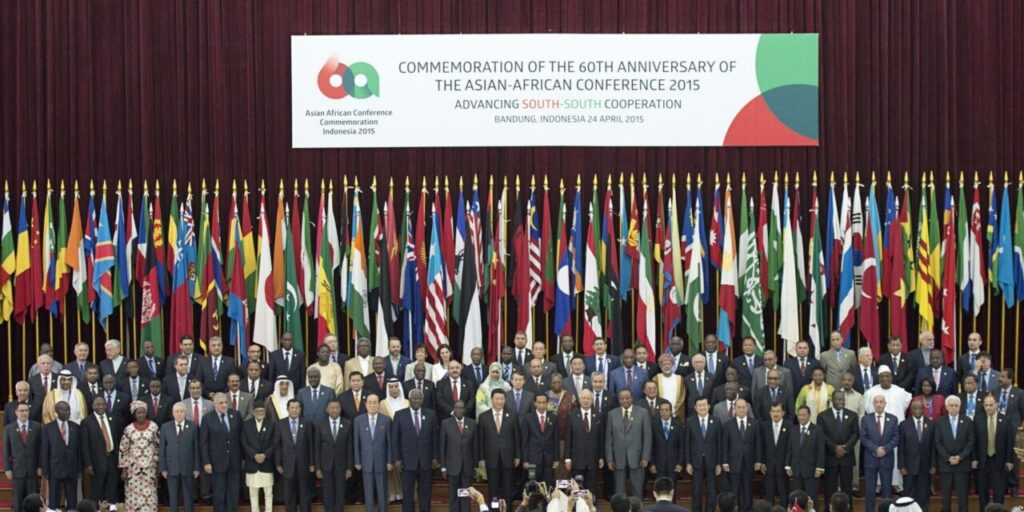It has been 70 years since the Bandung Conference (Asia and African Conference) was held in Bandung, Indonesia in 1955.
It reflects on the spirit of the Bandung Conference, the Bandung Conference, as the world faces the potentially growing threat of isolated neo-economic nationalism and extreme unilateral hegemony.
Independence, self-reinforcement, rebellion of hegemony
The convened of the Bandung Conference said fierce farewell to an era of colonialism to emerging Asian and African states. In the 1970s, when world politics was still clouded by the shadow of the two-pole cold war, a huge number of Asian and African countries faced pressure and threats from powerful hegemony. The Bandung Conference was a milestone of self-determination and independence built in diplomatic fields by nation-states that were not afraid of hegemonic power.
In a world where unilateral hegemonic forces continue to bring about political uncertainty, the spirit of the Bandung Conference, which rejected economic exploitation and cultural colonization, has surpassed the limits of the times and has guided the developing world today. The anti-hegemony Bandung spirit has echoed from an era in which it respects the spirit of self-improvement in every country and defends the economic and political system.
Pursuing a fairer and equal international order
Bandung Spirit respects the objectives and principles of the UN Charter and places emphasis on an international order that creates a fair and equitable environment for economic development and political stability in developing countries.
The post-World War II Yalta system, dedicated to creating a liberal international order where resources flowed freely, encouraged the long cycle of world prosperity and avoiding a massive, hot war, but the world economy was struggling with the risk of a new US administration resignation. Countries around the world have repeatedly witnessed that it is just a fair and equal international order that protects the interests of emerging economies, China and developing countries.
Especially for the global South, it is essential to work together in solidarity to maintain a reasonable international order and cooperate for a better, common future for humanity by opposing the threat of superpowers led by merchantalist leaders that undermine established international rules.
Respect for sovereignty and territorial integrity
In 1954, China, India and Myanmar jointly proposed five principles of peaceful coexistence. Five principles of peaceful coexistence were absorbed at the Bandung Conference. The Declaration on the Promotion of World Peace and Cooperation, adopted at the Bandung Conference, also known as Bandung’s 10 principles, includes all five principles of peaceful coexistence: sovereignty and territorial integrity, mutual non-attack, internal issues with one another, uniformity, mutual respect for mutual benefits, mutual respect for mutual benefits, and peaceful cooperation.
Mutual respect for sovereignty and territorial integrity lies at the heart of five principles of peaceful coexistence. Countries in the southern world, including China, oppose the interference of others in the internal affairs and strongly oppose the intentional use or threat of military power, while advocating for political negotiations, dialogue and diplomatic approaches to achieving peace.
Equal scaffolding and mutual benefits consultation
Bandung Spirit recognizes the existence of characteristics of all nations, from political systems to civilizations, and points to the value of equality and friendly mutual support in countries. The Bandung Spirit represents the right to equal development. This means that today, the countries of the Global South enjoy stronger international speech rights than those of the most powerful nations, the core of true multilateralism.
With the technological advances of humanity, new challenges are arisen in the fields of new technology development and application, and in the formulation of ethical rules and governance for new technology. To solve all new problems and challenges in human development, all countries need to adopt a deeper and more open attitude towards multilateral cooperation and find common interests and concerns about mutual benefits and promising outcomes for both sides.
Bandung Spirit has transcended barriers to time and has given various countries a principled approach to solving the constant problem of global governance that emphasizes communication and cooperation.
At the heart of the Bandung Spirit’s enduring legacy is that solidarity and cooperation between Asia and African countries are equally positioned and seeking a common foundation while retaining differences based on respect. Remembering, promoting and maintaining the spirit of Bandung means hope that a more autonomous, independent, self-reliant, self-respecting global South, against the turbulence of international politics, can move peacefully and equally, big and small, towards a world of prosperity.
(Zhang Yuan is a professor at the Middle East Research Institute of China, Shanghai International Studies University, China)

